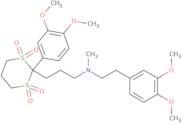
Tiapamil hydrochloride
CAS : 57010-32-9
Ref. 3D-HCA01032
| 1mg | 849,00 € | ||
| 5mg | 2.258,00 € | ||
| 10mg | 3.613,00 € | ||
| 25mg | 6.773,00 € | ||
| 50mg | 10.837,00 € |
Informations sur le produit
- 1,3-Dithiane-2-propanamine, 2-(3,4-dimethoxyphenyl)-N-(2-(3,4-dimethoxyphenyl)ethyl)-N-methyl-, 1,1,3,3-tetraoxide, hydrochloride
- 1,3-Dithiane-2-propanamine, 2-(3,4-dimethoxyphenyl)-N-[2-(3,4-dimethoxyphenyl)ethyl]-N-methyl-, 1,1,3,3-tetraoxide, hydrochloride (1:1)
- Dimeditiapramine
- Larocord
- N-[2-(3,4-dimethoxyphenyl)ethyl]-3-[2-(3,4-dimethoxyphenyl)-1,1,3,3-tetraoxido-1,3-dithian-2-yl]-N-methylpropan-1-aminium chloride
- Ro 11-1781
- Tiapamil HCl
- Tiapamil hydrochloride [USAN]
- m-Dithiane-2-propylamine, N-(3,4-dimethoxyphenethyl)-2-(3,4-dimethoxyphenyl)-N-methyl-, 1,1,3,3-tetraoxide, hydrochloride
- ((3,4-Dimethoxyphenethyl)(2-(2,3-dimethoxyphenyl)-1,3-dithian-2-yl)propyl)methylammonium chloride 1,1,3,3-tetraoxide
- Voir d'autres synonymes
Tiapamil hydrochloride is a drug that is used to treat cardiac conditions, such as chronic heart failure. Tiapamil hydrochloride binds to calcium and decreases the amount of calcium in the blood. This leads to a decrease in the force of contraction of the heart muscle and diastolic pressure, which are both associated with congestive heart failure. Tiapamil hydrochloride has been shown to reduce the risk of death and hospitalization due to cardiovascular causes by reducing myocardial infarction or papillary muscle dysfunction.
Tiapamil hydrochloride can cause drug interactions with other drugs that affect calcium levels, such as digoxin, phenytoin, or verapamil. It also has toxic effects on the kidneys and can lead to low glomerular filtration rate (GFR) or increased creatinine level in urine.
Propriétés chimiques
Question d’ordre technique sur : 3D-HCA01032 Tiapamil hydrochloride
Si vous souhaitez demander un devis ou passer commande, veuillez plutôt ajouter les produits souhaités à votre panier, puis demander un devis ou passer commande à partir de votre panier. C'est une méthode plus rapide, plus économique, et vous pourrez bénéficier des remises disponibles ainsi que d'autres avantages





